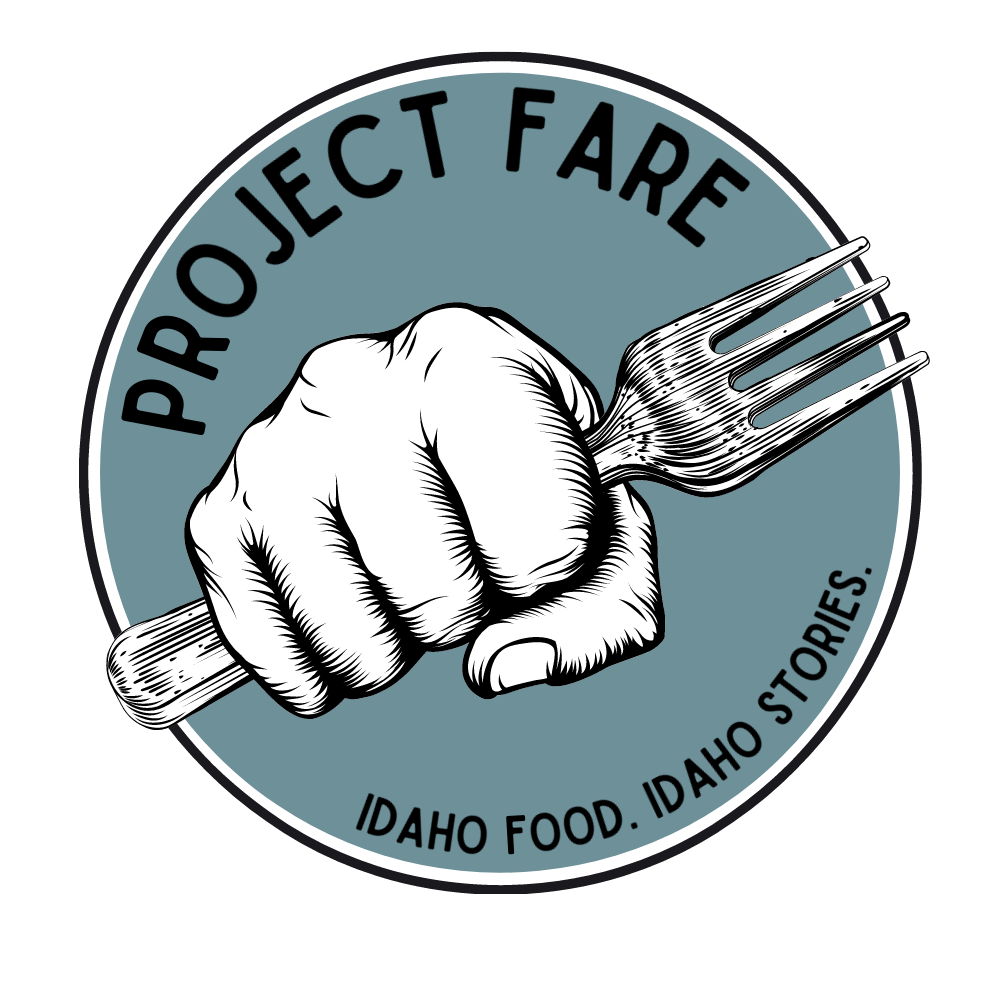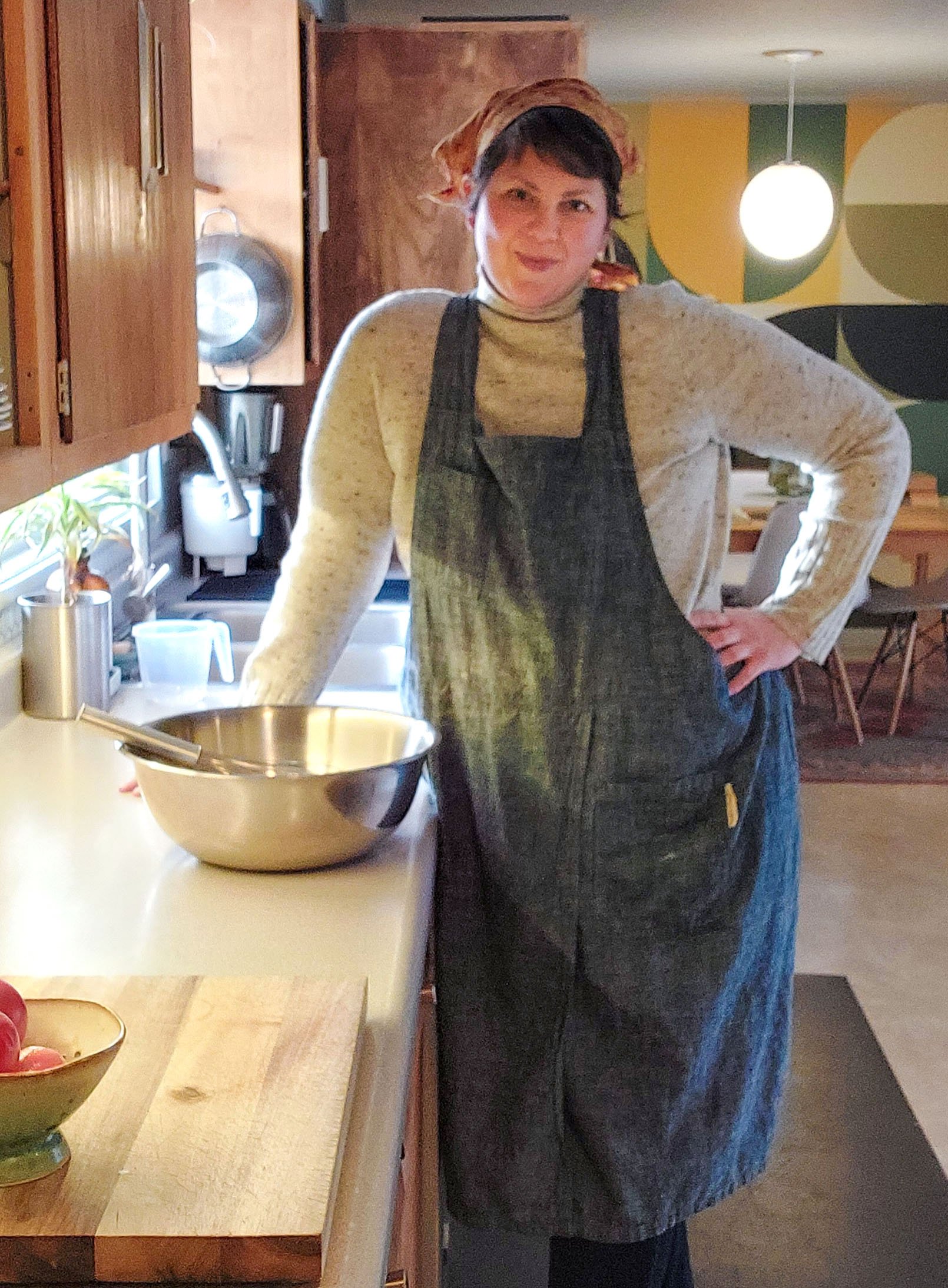Made with Love: Idaho bakers open cottage businesses to sell their custom creations
Idaho Farmhouse Bakery owner Philip Kock holds one of his chocolate chip cookies. Kock started the bakery in May 2021 in Moscow, Idaho.
Story by Riley Haun, feature photos by Geoff Crimmins
Molly Rizzuto of Goose House Bakery made this custom wedding cake with fresh flowers grown by Orchard Farm Soap in Moscow. | Photo courtesy of Molly Rizzuto
Some days, it feels to Molly Rizzuto like she’s more of a professional dishwasher or grocery shopper than she is a professional baker. As owner and sole employee of Goose House Bakery, a business she runs mostly out of her Moscow home, Rizzuto has a lot on her plate. From buying supplies to delivering cakes and balancing books, it’s all on her.
But after years spent creating beautiful desserts and pastries to a boss’s standards, Rizzuto wouldn’t trade the freedom gained by operating her own bakery from home — even if part of the trade-off is doing all her own dishes.
“I have chock-full days, but in there is lots of flexibility,” Rizzuto said. “When I've got cakes in the oven, I've got a little bit of downtime, and I can walk my dog or go out and plant some seeds in the garden. I know that if I burn a batch of caramel, I'll just start it over, no big deal. And nobody ever saw me do it.”
Rizzuto has been running Goose House out of her family’s kitchen since 2015, but more and more bakers on the Palouse are leveraging their skills and increased pandemic downtime to share their sugary creations with others for profit.
In Idaho, cottage baking laws allow entrepreneurial home bakers to sell goods made in their own kitchens directly to consumers, as long as they adhere to a few basic guidelines. Whether as a part-time side gig for a little extra cash or as a full-time business, with a little finesse and some word-of-mouth marketing, bakers like Rizzuto often find cottage baking pays off quite sweetly.
Quarantine-inspired creativity
Fraser Martens, who ran Baked by Fraser from his Moscow home until leaving the area in summer 2021, has been a home baker all his life. Pre-pandemic, he loved to break out his skills for big holiday gatherings. When COVID shut down his family’s Easter brunch plans in 2020, Martens offered to deliver handmade treats to his would-be guests’ doorsteps instead. To cover his costs, he asked a humble fee of $1 per person.
A selection of scones and doughnuts by Fraser Martens are prepared for delivery. | Photo courtesy of Fraser Martens.
“Word was getting around in our little circle that I was dropping off apple cinnamon breads and cookies and things on people's doorsteps for breakfast on Sundays,” Martens said. “And I was thinking, ‘I'm not doing anything else right now. I bet I could expand this a little bit and maybe make my baking habit a little less expensive.’”
Martens was able to gauge his market (and adjust his prices) as demand expanded from friends to coworkers to people he’d never even met. Initially serving up scones and cinnamon rolls, Martens quickly landed on doughnuts. They were easy to scale up and down as needed, not to mention enduringly popular for Saturday breakfasts.
“There were definitely Saturdays where around 8:30 a.m., I was cursing myself for having accepted 400 doughnuts’ worth of orders and praying I could get it together on time,” Martens said. “But it always did, and people were always so happy to see me when I arrived with their orders, and at a time when my family could always use the extra few hundred bucks a month, it was nice to be able to come up with it in a way I genuinely enjoyed.”
Philip Kock, who operates the Moscow-based Idaho Farmhouse Bakery, was among the countless quarantiners bit by the sourdough bug while laid off from his full-time job at a hardware store in spring 2020. Before that unanticipated free time, he’d never baked in his life. But he found he couldn’t stop, and Kock realized quickly he could offload his extra loaves and make some cash at the same time.
“I found that taking bread I baked myself out of the oven was this beautiful thing,” Kock said. “And it obviously helps pay the bills, but it helps that l I can fulfill the need to feed people and bring them this awesome moment in their day when they bite into it.”
Kock built his initial customer base among coworkers and friends, and is in the process of expanding beyond return buyers via his Facebook page and plenty of favorable word-of-mouth. Because artisan bread is more time-consuming and therefore often less cost-effective than other baked goods, Kock has spent the past year mastering the art of time management and now feels he’s struck a satisfying balance between profitable baking, his main job and spending time with his family.
Despite having a packed schedule, he still finds himself drawn to new challenges. Kock expanded his menu to include biscotti and gluten-free hand pies this summer, and he hopes to fill a niche for gluten-free artisan breads and keto diet-approved treats in the very near future.
A selection of cookies and pastries baked by Idaho Farmhouse Bakery’s Philip Kock. | Photo by Geoff Crimmins.
Finding a delicious niche
Molly Rizzuto stands in her home kitchen, which is also her bakery space for many creations. | Photo courtesy of Molly Rizzuto.
For Rizzuto, who runs Goose House full-time, the magic happens seven days a week. She bakes custom wholesale pastries for two Moscow cafes, so she rents space outside her home — wholesale goods don’t fall under cottage laws and must be made in a health department-approved commercial kitchen. After those orders are delivered, Rizzuto will usually make a trip to the grocery store for the day’s baking supplies, then she’s home by 8 a.m. to send her son off on the school bus.
From there, depending on the orders she’s accepted for the day, she might bake twenty layers of cake and whip up massive batches of buttercream, or set aside a couple hours to catch up on emails and bookkeeping. The good thing about working for yourself, Rizzuto said, is that your schedule is yours to create. If she’s swamped and needs catch-up time, she can decline orders for a day or two.
“I think that’s been a big draw and a reason for the growth in cottage baking we’ve seen recently in this area — people are stuck at home anyway, and if you enjoy baking, it’s a great way to become your own boss,” Rizzuto said. “And in this area, we don’t have a lot of brick-and-mortar bakeries, so there’s a big need there that people are starting to fill.”
That was part of why Martens chose doughnuts as his specialty. Besides the grocery chains, no one was doing doughnuts in Moscow, and he credits that gap for much of his success. But he also attributes his success to asking the right questions of the right people, from asking close friends to sample new recipes to asking an old coworker now running a restaurant of his own about the ins and outs of the food business.
Rizzuto, too, heartily recommends asking your silliest questions about getting started as a cottage baker to the people who know best. She remembers calling up her local health department branch just to run through a list of questions about what she could and couldn’t sell or what paperwork she needed, and coming away comforted that she was set up for success.
“I think it can be intimidating to start towards a venture like going into business for yourself because there are all these little steps to take at once, but quickly you learn that one at a time they’re very doable,” Rizzuto said. “What you learn in baking is that it's all just trying things. If it works, it works and if it doesn't, move on.”
Idaho Cottage Food Laws
Idaho’s food code defines cottage foods as being made in a person’s home and sold directly to a consumer. No permit or license is needed to sell cottage foods, but venues like farmers’ markets can require sellers to prove they’ve consulted with a health department to ensure food safety.
Compared to neighboring states, Idaho’s cottage food regulations are fairly lax and don’t require a process of certification or inspection, something both Rizzuto and Martens said helped them feel more comfortable about the costs of starting a business.
Cottage foods can include anything from cakes and cookies to vinegars and trail mix, but nothing that requires refrigeration can be sold as a cottage food. For Rizzuto, that means Goose House’s signature carrot cake comes with spiced buttercream rather than the traditional cream cheese frosting, but she’s rarely heard anyone complain.
If you’re unsure whether a recipe meets the standards for cottage sales, Rizzuto recommends consulting with your local health department. When she was getting started, Rizzuto submitted her bakery menu to determine which items qualified as “low-spoilage” and thus could be sold as a cottage food. Her apple pie recipe, low in moisture and high in sugar, made the cut; cheesecake, however, was out.





